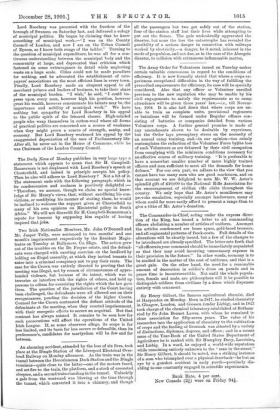The Army Order for Volunteers issued on Tuesday makes certain
valuable concessions in regard to the conditions of efficiency. It is now formally stated that where a corps ex- periences exceptional difficulties in the way of fulfilling the prescribed requirements for efficiency, its ease will be specially considered. Also that any officer or Volunteer enrolled previous to the. new regulation who may be unable by his civil engagements to satisfy the requirements as to camp attendance will be given three years' law,—i.e., till Novem- ber, 1904. It is also laid down that where corps are un- able to train as complete units, provisional regiments or battalions will be formed under Regular officers con- sisting of batteries or companies detailed from various Volunteer corps. A further general promise is made of any amendments shown to be desirable by experience, but the Order lays peremptory stress on the necessity of an annual camp training, and—in our opinion—too calmly contemplates the reduction of the Volunteer Force bytthe loss of such Volunteers as are debarred by their civil occupation from complying with the minimum conditions necessary for an effective course of military training. "It is preferable tc have a somewhat smaller number of more highly trained officers and men sufficient to meet all the demands for home defence." For our own part, we adhere to the view that you cannot have too many men who are good marksmen, and on that account we are delighted to note Mr. W. W. Astor's splendid gift of £10,000 to the National Rifle Association for the encouragement of civilian rifle clubs throughout the country. We only hope that Mr. Astor's munificence may prevoke emulation, especially amongst landowners, many of whom could far more easily afford to present a range than to give a tithe of Mr. Astor's donation.


































 Previous page
Previous page